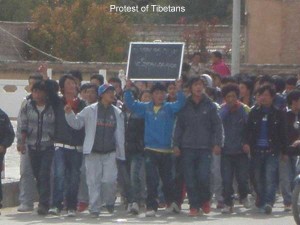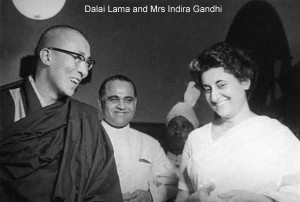The message from the article was clear: Yes, China must embark on political reforms, but they should be carried out under the leadership of the Communist Party. The measures undertaken should reform the functioning of the Government and the Party without weakening them.
 In his speech at Shenzhen on September 6, Hu Jintao avoided the use of expressions such as political re-structuring etc. Hu’s emphasis was on Shenzhen as a trigger for the Chinese economic miracle. . But Hu’s speech was not devoid of references to the political system as made out by some analysts. He said that the SEZs could experiment with reforms in economic, political, cultural and social systems.Hu called for “expanding socialist democracy” and speeding up the construction of “a socialist country under the rule of law.” He said efforts should be made to carry out democratic elections, decision-making, management and supervision in order to safeguard the people’s right to know, to participate, to express and to supervise.In September, Wen was in New York to attend the UN General Assembly session.He was interviewed by Fareed Zakaria for CNN’s Global Public Square programme. Zakaria asked him about freedom in China: “Can you be as strong and creative a nation with so many restrictions on freedom of expression, with the internet being censored?” Wen replied: “I believe freedom of speech is indispensable, for any country, a country in the course of development and a country that has become strong. Freedom of speech has been incorporated into the Chinese constitution. I often say that we should not only let people have the freedom of speech, we more importantly must create conditions to let them criticise the work of the government. It is only when there is the supervision and critical oversight from the people that the government will be in a position to do an even better job, and employees of government departments will be the true public servants of the people.”
In his speech at Shenzhen on September 6, Hu Jintao avoided the use of expressions such as political re-structuring etc. Hu’s emphasis was on Shenzhen as a trigger for the Chinese economic miracle. . But Hu’s speech was not devoid of references to the political system as made out by some analysts. He said that the SEZs could experiment with reforms in economic, political, cultural and social systems.Hu called for “expanding socialist democracy” and speeding up the construction of “a socialist country under the rule of law.” He said efforts should be made to carry out democratic elections, decision-making, management and supervision in order to safeguard the people’s right to know, to participate, to express and to supervise.In September, Wen was in New York to attend the UN General Assembly session.He was interviewed by Fareed Zakaria for CNN’s Global Public Square programme. Zakaria asked him about freedom in China: “Can you be as strong and creative a nation with so many restrictions on freedom of expression, with the internet being censored?” Wen replied: “I believe freedom of speech is indispensable, for any country, a country in the course of development and a country that has become strong. Freedom of speech has been incorporated into the Chinese constitution. I often say that we should not only let people have the freedom of speech, we more importantly must create conditions to let them criticise the work of the government. It is only when there is the supervision and critical oversight from the people that the government will be in a position to do an even better job, and employees of government departments will be the true public servants of the people.”
The Chinese authorities have seen to it that the rest of the world does not know much of the internal security situation, but it is of major concern to the leadership.
From Wen’s comments at Shenzhen and from his subsequent interview on the CNN, many analysts jumped to the conclusion that Hu and Wen were probably not on the same wavelength as regards the need for political restructuring in China and greater respect for the freedom of speech. But if one read and analysed carefully the statements and comments made by Hu and Wen since the 17th National Congress of the Party in October 2007, it was evident that both in their own respective style were reflecting the party line on the need for political restructuring and how to go about it.
However, expectations and speculation that the 5th plenum of the 17th Central Committee would come out with a slew of political reforms as forward-looking and as significant as the economic reforms of the post-1978 years were belied. The advocates of political gradualism and opponents of hasty actions seemed to have prevailed over those advocating a faster pace of political reforms. A communiqué issued at the end of the plenum said that the leadership of the Communist Party of China (CPC) would be the “fundamental guarantee” for China to achieve the goals of the economic and social development plan for the next five years. It added that steps to improve the CPC’s ruling capacity and maintain the Party’s advanced nature should be strengthened to promote the Party’s competence in leading the country’s economic and social development. A reformed, people-friendly Communist Party and not a reformed political structure emerged as the present objective.
 Why this cautious line? Why, after the enthusiastic debate in the months after October 2007 on the need for political restructuring, the present emphasis on the need for a more gradual approach? Maintaining political stability, economic prosperity and social harmony is the driving force of Chinese policy-making. Three events since October 2007 have made the Chinese leadership feel that they cannot take the present stability, prosperity and harmony for granted. Potentially destabilizing factors continue to confront the leadership.These events are: firstly, the economic melt-down; secondly, the uprising in Tibet in 2008 just before the Olympics; and thirdly, the violent incidents in the Xinjiang Province before the Olympics which were followed by a violent uprising by the Uighurs in the middle of 2009. The economic melt-down resulted in the retrenchment of about 30 million Chinese workers due to the closure of a number of manufacturing industries in the coastal areas due to a drop in orders from the West, particularly the US. These workers had migrated to the coastal areas from the rural areas to take up jobs. Their retrenchment and return to their villages created fears of possible widespread social unrest. However, these fears have been belied, but a new cause of unrest has arisen as a result of the economic re-restructuring undertaken by the Chinese leadership to reduce the dependence on exports and to increase the domestic demand for manufactured goods by increasing the minimum wages of workers in many towns.
Why this cautious line? Why, after the enthusiastic debate in the months after October 2007 on the need for political restructuring, the present emphasis on the need for a more gradual approach? Maintaining political stability, economic prosperity and social harmony is the driving force of Chinese policy-making. Three events since October 2007 have made the Chinese leadership feel that they cannot take the present stability, prosperity and harmony for granted. Potentially destabilizing factors continue to confront the leadership.These events are: firstly, the economic melt-down; secondly, the uprising in Tibet in 2008 just before the Olympics; and thirdly, the violent incidents in the Xinjiang Province before the Olympics which were followed by a violent uprising by the Uighurs in the middle of 2009. The economic melt-down resulted in the retrenchment of about 30 million Chinese workers due to the closure of a number of manufacturing industries in the coastal areas due to a drop in orders from the West, particularly the US. These workers had migrated to the coastal areas from the rural areas to take up jobs. Their retrenchment and return to their villages created fears of possible widespread social unrest. However, these fears have been belied, but a new cause of unrest has arisen as a result of the economic re-restructuring undertaken by the Chinese leadership to reduce the dependence on exports and to increase the domestic demand for manufactured goods by increasing the minimum wages of workers in many towns.
There have been many instances of workers unsatisfied with the increase in minimum wages resorting to strikes—particularly in foreign-owned enterprises—- in order to demand more. Fortunately, the labour unrest has not so far affected Government servants. There have been no reported instances of Government servants resorting to strikes in order to demand an increase in their salaries. If they do so, the political leadership could be faced with a tricky situation. The ambitious stimulus package to keep the economy doing well at a GDP growth rate of eight per cent plus and the increase in minimum wages have led to a spiraling inflationary situation with a potential for social unrest. While dealing with these problems through energetic economic management measures, the Government is at the same time avoiding hasty political actions which could cause instability due to a mix of political and economic factors.




